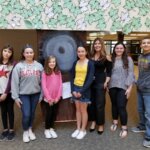






An Anthropologist Discusses the Benefits of Unstructured Play
This fantastic TEDx Talk by evolutionary anthropologist Dorsa Amir is music to our ears at Let Grow. Amir studied a modern foraging society in the Ecuadorean Amazon and made some fascinating discoveries about the way kids there play, learn, and grow. She was fascinated by the way their miniature society thrived alongside that of the adults, and especially impressed by all they learned from unstructured play. Check out our video highlights below, and be sure to take the time (less than 12 minutes) to watch it yourself.
Today’s generation is losing an important sense of independence.
In the rainforest, Amir saw kids climb dozens of feet into trees to pick papayas when they were hungry. They used sharp tools and cooked over hot fires to prepare meals. This seemed strange to Amir at first. But when she returned home, she found that the Amazonian kids had independence that their Western peers lacked. “Childhood has changed, very recently and very rapidly,” she says. One big change is the loss of unstructured play, where kids often imitate adults and practice valuable skills.
Through unstructured play, children learn how to become adults.
“In small-scale societies, alongside the adult community, is a complex mini-community of children,” Amir notes. She stresses the value of these multi-age, multi-gender groups in preparing kids for their lives as adults. “To become a successful adult in any culture,” explains Amir, “children have to learn an enormous number of complicated skills.” This includes technical skills, of course, but also softer skills like problem-solving.
Kids everywhere, Amir tells us, learn by watching adults and incorporating adult behaviors into their play. “This is one of the reasons that play itself has evolved.” Think back to your own time playing “house” or “school” as a kid. This kind of unstructured play allowed you to practice the things you saw adults doing every day.
Kids teach to and learn from one another.
The great benefit of a mixed-age play group is that older kids get a chance to show younger kids what they know. Teaching is actually an excellent way to learn, so older kids strengthen their own skills as they teach them to littler kids. “Teaching helps you learn,” Amir states. And a lot of that teaching happens through unstructured play.
How can we give kids our own kids these benefits?
“It’s hard to find these patterns in Western society,” muses Amir. “Kids here spend the majority of their development in a room with other kids their own age, by design. Adults are totally in charge of the content and structure of their time.” In a school setting, she notes, adults tell kids when and what to learn, when to play, even when to eat or use the bathroom. So what can we do? Amir recommends these three things:
- Set up more mixed-age play dates.
- Allow kids the room they need to make mistakes.
- Give kids more unstructured playtime.
Amazingly enough, these are exactly the reasons we established the Let Grow Play Club project. Schools open their gyms or playgrounds for self-directed unstructured play before or after school. Adults are there, but they function as observers but don’t coach or interfere. Kids of all ages play together, doing whatever seems like fun. If you’d like to try this at your own school, learn more and contact us here.



Comments are closed for this article.